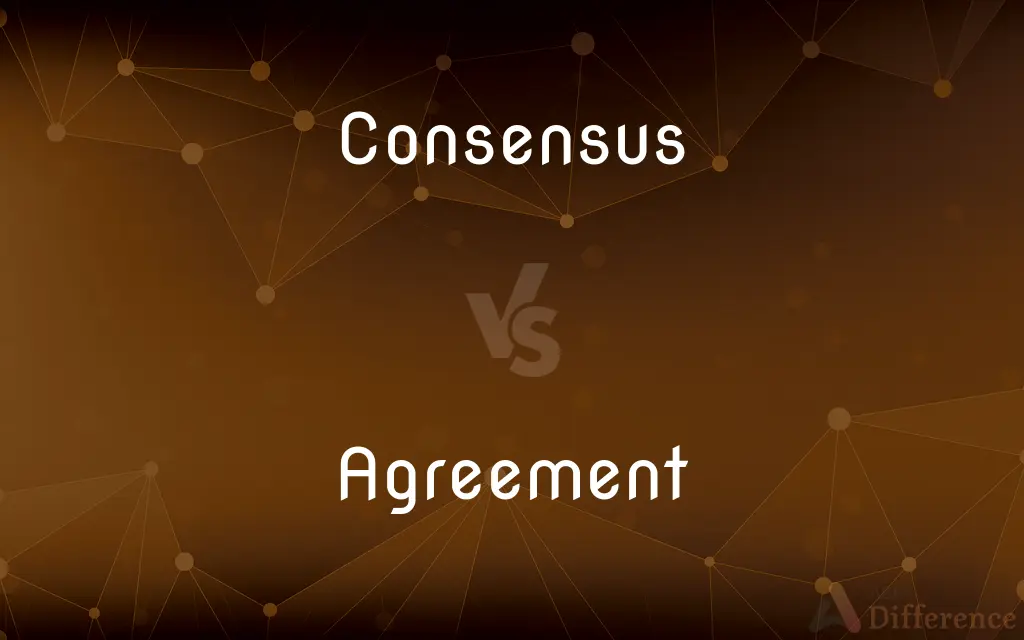Consensus vs. Agreement — What's the Difference?
By Tayyaba Rehman & Urooj Arif — Updated on March 10, 2024
Consensus involves a general or widespread acceptance among all members, focusing on collective decision-making; agreement is a specific understanding or arrangement between two or more parties.

Difference Between Consensus and Agreement
Table of Contents
ADVERTISEMENT
Key Differences
Consensus is achieved when all members of a group or community broadly accept a decision or proposal, emphasizing the importance of collective harmony and unity. On the other hand, agreement often refers to a formal or informal understanding reached between two or more entities, highlighting the significance of mutual consent on specific terms or conditions.
Consensus requires a process of negotiation and discussion where the aim is to address and include the concerns and preferences of all parties involved. This often leads to decisions that are more inclusive and represent the collective will. Whereas, agreements can be reached through negotiation as well, but they focus more on satisfying the specific terms agreed upon by the parties, which may not always consider the wider group's preferences.
In consensus-building, the goal is often to find a solution or decision that, while it may not be the first choice of all individuals, is acceptable to all. This approach fosters collaboration and long-term relationships. On the other hand, agreements, especially legal ones, are binding and enforceable, focusing on compliance with agreed-upon terms rather than on maintaining ongoing relationships.
Consensus is commonly used in settings where the process and relationship are as important as the outcome, such as in cooperative groups or collectives. Agreements, however, are often utilized in more formal contexts, such as contracts in business, where specific actions or exchanges are outlined.
While consensus seeks to minimize opposition and create a sense of ownership among all participants, agreements might only require a minimum level of acceptance to be considered valid, potentially leaving some parties' preferences unaddressed.
ADVERTISEMENT
Comparison Chart
Definition
General acceptance among all members of a group.
Specific understanding or arrangement between parties.
Focus
Collective harmony and decision-making.
Mutual consent on specific terms.
Process
Involves inclusive negotiation and discussion.
May involve negotiation, focuses on satisfying specific terms.
Outcome
Acceptable to all, not necessarily the first choice.
Binding and enforceable, based on agreed terms.
Context
Used in cooperative and collective settings.
Used in formal contexts like contracts.
Relationship
Fosters collaboration and long-term relationships.
Focuses on compliance, may not emphasize ongoing relationships.
Enforcement
Not legally binding, based on mutual respect.
Often legally binding and enforceable.
Preference
Aims to address preferences of all parties.
May not address all parties' preferences.
Implementation
Seeks to minimize opposition, fosters ownership.
Requires minimum level of acceptance.
Compare with Definitions
Consensus
A decision-making approach that emphasizes unity and inclusivity.
The team operates on a consensus basis to ensure everyone's voice is heard.
Agreement
A mutual decision on a specific issue.
The agreement on the deadline helped streamline the project's timeline.
Consensus
An outcome where all participants broadly support the decision.
The consensus on the project direction was evident in the unanimous support.
Agreement
An understanding reached after negotiation.
After lengthy discussions, both parties reached an agreement.
Consensus
A collective agreement reached by all members of a group.
The committee reached a consensus on the new policy after hours of discussion.
Agreement
A legally binding contract specifying terms and conditions.
The agreement outlines the responsibilities of each party.
Consensus
The process of finding a proposal acceptable to all members.
Achieving consensus required compromising on several key issues.
Agreement
A formal or informal arrangement between two or more parties.
They entered into an agreement to share the profits equally.
Consensus
The absence of strong opposition within a group.
While not everyone's first choice, there was a consensus to move forward.
Agreement
An accord or concord between parties on a plan of action.
Their agreement on marketing strategies was crucial for the campaign's success.
Consensus
An opinion or position reached by a group as a whole
"Among political women ... there is a clear consensus about the problems women candidates have traditionally faced" (Wendy Kaminer). See Usage Note at redundancy.
Agreement
Harmony or accordance in opinion or feeling
The governments failed to reach agreement
The two officers nodded in agreement
Consensus
General agreement or accord
Government by consensus.
Agreement
The act of agreeing
When did the agreement take place?.
Consensus
A process of decision-making that seeks widespread agreement among group members.
Agreement
Harmony of opinion; accord
Since we are all in agreement, let's proceed.
Consensus
General agreement among the members of a given group or community, each of which exercises some discretion in decision-making and follow-up action.
After years of debate over the best wine to serve at Thanksgiving, no real consensus has emerged.
Agreement
An arrangement between parties, usually resulting from a discussion, regarding a course of action.
Consensus
(computing) An agreement on some data value that is needed during computation.
Agreement
A properly executed and legally binding contract.
Consensus
(attributive) Average projected value.
A financial consensus forecast
Agreement
The writing or document embodying this contract.
Consensus
(ambitransitive) To seek consensus; to hold discussions with the aim of reaching mutual agreement.
Agreement
(Grammar) Correspondence in gender, number, case, or person between words.
Consensus
Agreement; accord; consent.
That traditional consensus of society which we call public opinion.
Agreement
(countable) An understanding between entities to follow a specific course of conduct.
To enter an agreement;
The UK and US negotiators nearing agreement;
He nodded his agreement.
Consensus
Agreement in the judgment or opinion reached by a group as a whole;
The lack of consensus reflected differences in theoretical positions
Those rights and obligations are based on an unstated consensus
Agreement
(uncountable) A state whereby several parties share a view or opinion; the state of not contradicting one another.
The results of my experiment are in agreement with those of Michelson and with the law of General Relativity.
Agreement
A legally binding contract enforceable in a court of law.
Agreement
Rules that exist in many languages that force some parts of a sentence to be used or inflected differently depending on certain attributes of other parts.
Agreement
An agreeable quality.
Agreement
State of agreeing; harmony of opinion, statement, action, or character; concurrence; concord; conformity; as, a good agreement subsists among the members of the council.
What agreement hath the temple of God with idols ?
Expansion and duration have this further agreement.
Agreement
Concord or correspondence of one word with another in gender, number, case, or person.
Agreement
A concurrence in an engagement that something shall be done or omitted; an exchange of promises; mutual understanding, arrangement, or stipulation; a contract.
Agreement
The statement (oral or written) of an exchange of promises;
They had an agreement that they would not interfere in each other's business
There was an understanding between management and the workers
Agreement
Compatibility of observations;
There was no agreement between theory and measurement
The results of two tests were in correspondence
Agreement
Harmony of people's opinions or actions or characters;
The two parties were in agreement
Agreement
The thing arranged or agreed to;
They made arrangements to meet in Chicago
Agreement
The determination of grammatical inflection on the basis of word relations
Agreement
The verbal act of agreeing
Common Curiosities
What is an agreement?
An agreement is a specific understanding or arrangement between two or more parties, often legally binding, focusing on mutual consent on specific terms.
How does consensus differ from agreement?
Consensus focuses on collective harmony and decision-making, requiring acceptance by all group members, whereas an agreement is a specific arrangement between parties that may not involve the broader group.
What are the challenges of achieving consensus?
Achieving consensus can be challenging due to differing opinions and interests, requiring time and effort to find a solution that is acceptable to everyone.
Is an agreement always a formal contract?
An agreement can be formal or informal, but formal agreements, like contracts, are legally binding and specify terms and conditions.
Why is consensus important in a team setting?
Consensus is important in team settings because it fosters collaboration, ensures all voices are heard, and builds long-term relationships by emphasizing collective decision-making.
What is consensus?
Consensus is a general acceptance or agreement among all members of a group, emphasizing inclusivity and collective decision-making.
How is consensus achieved?
Consensus is achieved through inclusive negotiation and discussion, aiming to find a solution acceptable to all group members.
Can an agreement disregard some parties' preferences?
Yes, agreements might focus on satisfying specific terms agreed upon by the negotiating parties, potentially leaving some preferences unaddressed.
Can consensus be legally binding?
Consensus itself is not typically legally binding; it's more about mutual respect and collective decision-making within a group.
What role does negotiation play in reaching an agreement?
Negotiation is crucial in reaching an agreement, as it involves discussing and settling on specific terms mutually acceptable to the involved parties.
Are all agreements enforceable by law?
Most formal agreements, especially contracts, are enforceable by law, provided they meet legal criteria, whereas informal agreements may not be legally enforceable.
How do consensus and agreement affect decision-making?
Consensus affects decision-making by striving for a decision acceptable to all, promoting unity and inclusivity, whereas agreements clarify specific terms and conditions, often focusing on practical outcomes.
Can an agreement be part of the consensus process?
Yes, an agreement on specific aspects can be part of the consensus process, especially if it helps to achieve broader acceptance among all group members.
Can a group reach an agreement without consensus?
Yes, a group can reach an agreement on specific issues without achieving consensus if the decision doesn't require the approval of all members.
How do consensus and agreement contribute to conflict resolution?
Consensus and agreement both contribute to conflict resolution by facilitating dialogue and understanding, aiming for solutions that respect the interests of all parties involved.
Share Your Discovery

Previous Comparison
Airmen vs. Airman
Next Comparison
Coffee vs. FrappeAuthor Spotlight
Written by
Tayyaba RehmanTayyaba Rehman is a distinguished writer, currently serving as a primary contributor to askdifference.com. As a researcher in semantics and etymology, Tayyaba's passion for the complexity of languages and their distinctions has found a perfect home on the platform. Tayyaba delves into the intricacies of language, distinguishing between commonly confused words and phrases, thereby providing clarity for readers worldwide.
Co-written by
Urooj ArifUrooj is a skilled content writer at Ask Difference, known for her exceptional ability to simplify complex topics into engaging and informative content. With a passion for research and a flair for clear, concise writing, she consistently delivers articles that resonate with our diverse audience.














































